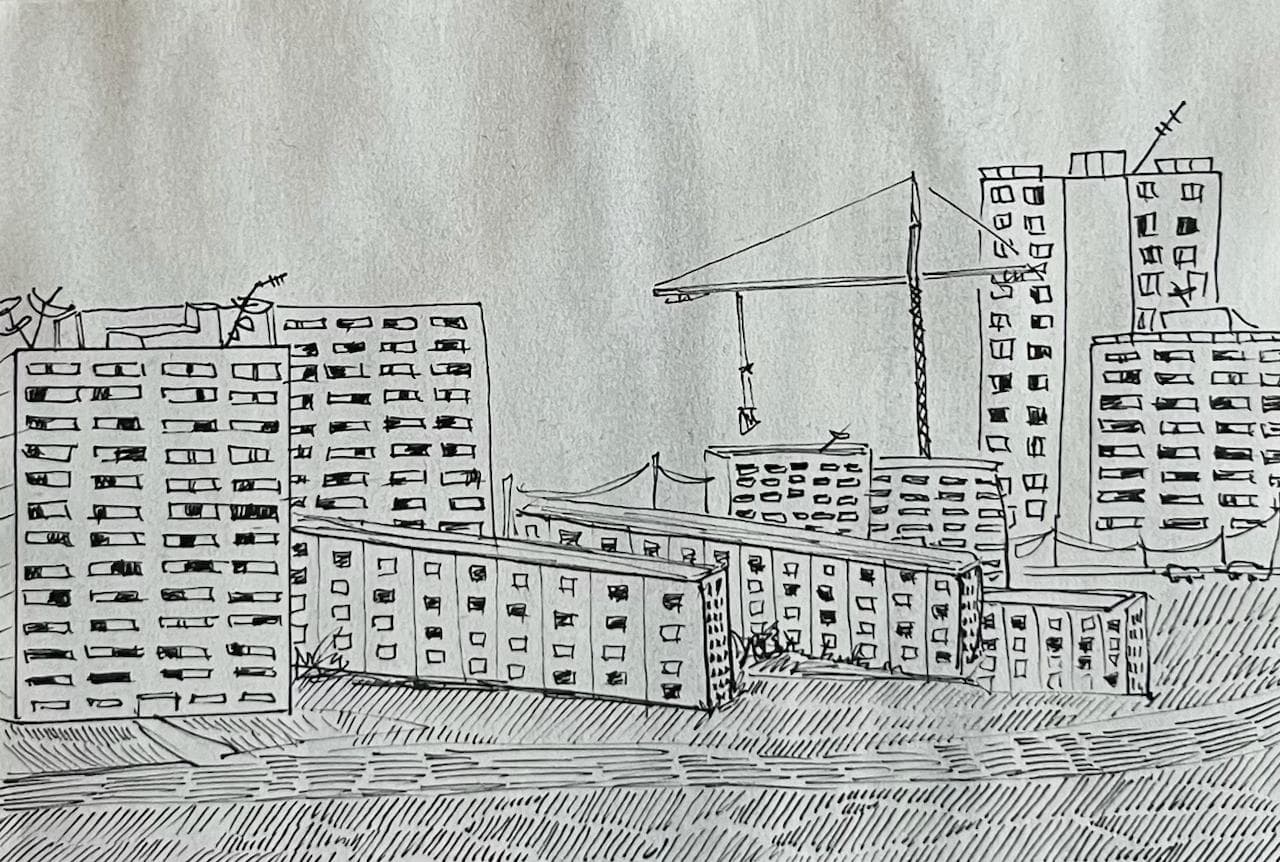The Brutalist only seems interested in poking, picking through, and prodding at, the heavily proportioned and thematically decadent repast that it doles out for itself. It’s premature to accuse the movie of being under-seasoned when the cook has bitten off more than he can chew: director Brady Corbet’s teeth don’t sink into his film’s ideas as much as they teasingly glide across its succulent crust of reified film fat. Like a chef, he knows to start with only the finest and freshest ingredients (the movie deals with intriguing themes of legacy, exile, assimilation, modernism, and tradition) but concocts a cinematic dish that, while rich, leaves you with a shallow feeling in your stomach.
The movie follows the post-war life of László Tóth (Adrien Brody), a Jewish-Hungarian architect who emigrates to the United States after living in Axis Hungary. Notably, Laszlo is a Holocaust survivor: he and his wife had been sent to Buchenwald, survived, then were forcibly separated afterward. The traumatic connotations of his imprisonment are woven into many of the film’s important plot points but, as seen at the end, is not necessarily given the most nuanced or organic development throughout the film.
His introduction in the movie (coinciding with his landfall in America) is jarring and cacophonous. He trudges through the metallic dungeon of a transatlantic liner in near total darkness, then emerges under blinding sunlight in New York Harbour. The buildup of tension throughout the sequence is wrought with dissonance; flesh and metal, darkness, confusion, and hysteria crescendo to an ambiguous climax: an inverted shot of the Statue of Liberty. Lady Liberty, who is normally a symbol of American prosperity and hope, has been confused by the camera angle—what we interpret as Laszlo’s point of view.
After arriving in America, Laszlo is taken in by his Americanized cousin, Atilla (Alessandro Nivola), who houses and employs him. We learn that Atilla has abandoned Judaism and converted to Catholicism under the influence of Audry (Emma Laird), his goodly wife. Audry, for her part, accosts Laszlo at unexpected moments—she calls his nose grotesque and tells him outright that he doesn’t belong (in both her house and his adopted country). Laszlo submits to her critiques but is summarily banished by his cousin after a boisterous falling out with a wealthy client. The Atilla sequence develops Laszlo as a brilliant yet vulnerable savant; he is a magnet of unprompted derision, which the film suggests is a consequence of his alien, Hungarian-Jewish identity. While the reading isn’t far-fetched, it lacks a connective sheen that would polish it into a more nuanced representation or analysis of Jewish experience. Audry’s dismissal of Laszlo is intermittent and out of the blue; his cousin expels him with frustrating cruelty—both are indeed shocking but feel as if they fall short of proper cinematic elucidation.
More forward examples of the Jewish experience in the film are past the movie’s halfway point. After the intermission (a peculiar, but necessary, feature of the nearly 215-minute-long “epic”) Laszlo’s wife, Erzsebet (a brilliant Felicity Jones) and his niece, Zsofia (Raffey Cassidy) finally arrive in America and reunite with him. Zsofia suffers from PTSD after surviving the concentration camps—her trauma is so pronounced that she loses her ability to speak; Erzsebet cannot walk because of osteoporosis caused by famine. The two encounter conflicts of their own, caused by their similarly ‘alien’ presence among the Americans.
Again, while the seeds of fertile thematic flora are rich in both characters, there is no flourishing moment of development or growth—especially in Zsofia’s case. Her muteness is hastily resolved in a flash-forward sequence, where she regains her ability to talk and announces that she is making Aliyah. Her understandable reservation and tepid screen presence as a victim of trauma are taken for granted—the complex colour of her character would have flowered more vibrantly if Corbet had elaborated on her muteness and unique screen presence.
When, in the film’s epilogue, she delivers a summation of her uncle’s architectural achievements, it’s hard to ignore how contrived her screen presence feels. This is undoubtedly the effect of her being rushed through the movie, not having enough time to properly simmer through the complex emotions and disposition her kind of character begs.
The Brutalist, then, amounts to a film with grand ambitions and succulent initial conditions. But in the continuation—the working out of its complex themes of immigrant, foreign, and Jewish experience—it suffers from a lack of patience and has a greater appetite than it can manage.
Powered by Froala Editor



-To3NzIDQctvdWpcIus7C9cajIIzBLX.jpg&w=128&q=75)


-T2vbBmqJPcvYkT1kJPMA3jx0J0ZpHA.png&w=640&q=75)